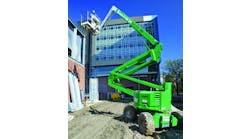While environmentalists were once derided in some quarters as wacked-out tree-huggers, environmentalism is now a popular buzzword on campaign trails and in corporate boardrooms. But for Scottsdale, Ariz.-based RSC Equipment Rental, environmental awareness has been part of the company's business model for years. Cultivating sustainability, as the company calls it, has been part of RSC's business model because it helps sustain the planet, because it enhances safety, because it's the right thing to do, because customers are demanding it and because it makes good business sense.
For example, back in 2001, RSC made a serious commitment to refurbish used equipment. In 2003, the company researched and then inaugurated the use of environmentally safe parts washers, including the use of non-hazardous chemicals. The company has been conducting an ongoing paper-reduction effort for years, with increased use of electronic data interchange for billing and receivables, and utilization of tools such as e-fax to reduce waste and enhance efficiency. RSC partnered with great companies like JLG Industries to launch a solid-tire initiative, outfitting all the forklifts in the company's rental fleet with solid tires. Used also now on skid-steer loaders, the solid tires last three- to four-times longer than foam-filled tires, creating less landfill waste as well as enhancing the safety, comfort and efficiency of the operator.
Under the direction of RSC's senior vice president Kevin Groman, RSC has put together a “green team” of about eight staffers. The green team has the responsibility to continually look for environmental solutions, to research and develop efforts to enhance the environment as well as promote safety, efficiency and response to customer needs. The company has a motto, using the company's acronym RSC: recycle, simplify, cultivate (sustainability).
“RSC believes it is responsible for cultivating sustainability with its suppliers, customers and employees and we are proud to partner with our vendors in customer-driven innovations to benefit customers and our community,” says CEO Erik Olsson. “Through these environmentally friendly initiatives and others, RSC has already reduced CO2 emissions by more than 26 million tons, and we anticipate that we will have saved more than $100 million through the implementation of these and other programs that focus on the needs of our customers while positively impacting the environment.”
Groman explains the motto further. “The key to the green team is really to empower people to cultivate sustainability,” he says. “That really sums up our purpose, to help people see through a green set of lenses and just look at things from a different perspective. When you do that, you're helping people to truly cultivate sustainability, whether it's working with our vendors to focus on solid tires, working with truck drivers to reduce engine idle time, or the parts washers, or a variety of other elements that we've worked on to further sustainability for the benefits of the environment. Each one of these are beneficial for the company as well.”
The “green” committee's most recent initiative is a tire-pressure equalizer that facilitates the checking of tire pressure on delivery trucks. Through the use of a “cat's eye,” the driver can walk around the truck and visually check if the tires are inflated to their proper weight. If they are under-inflated, the cat's eye will be open, thus requiring a pressure adjustment. With most delivery trucks running on a dual-tire system, with four sets of two tires on each side of the vehicle, RSC's research showed that typically to check each tire with a tire gauge, particularly time-consuming and difficult on the inner tires, it could take a driver nearly an hour, especially when weight adjustments were necessary. Typically a driver would walk around the truck, kick or pound a tire with a hammer, and if the weight seemed “close enough” the driver would get on the road.
“If you're running under-inflated, there's a safety factor involved,” says Ron Harkness, an RSC green team member. “The Department of Transportation found that 20.9 percent of the accidents on highways involving large trucks were caused by under-inflation. So the equalizer is a win-win from all areas, saving fuel, maintenance and efficiency costs and keeping RSC drivers safe.”
With the tire-pressure equalizer, the driver can tell just by sight if the tire is under-inflated. Hooking up the air hose to a gauge that connects the inner and outer tire, the driver can quickly and easily fill the tire to its proper weight. The driver can check and fill the entire truck in about 15 minutes.
RSC's green team is constantly looking at ways to improve the environment, including working with vendors to reduce equipment emissions. “That's an area where we have an impact due to the strength of our relationships with our vendors,” says Groman. “We have great vendors who are interested in the same things and want to do it for the right reasons.”
Groman adds that RSC's customers are also driving innovation. “Everything we do is usually the result of what our customers want,” he adds. “Many of our customers are concerned about the environment, and some know they need greener equipment to be awarded a contract from a particular government agency or vendor who is concerned about trying to reduce emissions.”
The green team is continually working on ways the company can improve internally, such as a recent recycling effort, and is studying a number of initiatives that can improve efficiency and safety as well as improve the environment.
“We hope our entire industry embraces this way of thinking,” says Groman. “Not only will it be the right thing for their bottom line, but it will be the right thing for the environment and we'll all win if that's the case.”





